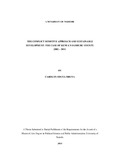| dc.description.abstract | This study examined the sustainability of outcomes of conflict-sensitive development
interventions. The study used a case study of Samburu County. It sought to respond the
question: what is the sustainability of outcomes of conflict-sensitive development
interventions in Samburu County?
The study utilized both primary and secondary data. Primary data was obtained through
a sample size of 86 respondents from communities and institutions. The process of data
collection entailed the use of participant observation, structured interviews, two focus
group discussions and key informant interviews. The target individuals included
funding agency officials, evaluators of development interventions, practitioners of the
conflict sensitive approach, local community members, local community elders, local
beneficiaries of development interventions, County Government officials. The
institutions that participated in this study include the Kenyan Conflict Sensitivity
Consortium, funding agencies targeting Samburu County; implementing agencies that
work in Samburu County, the County Government and local learning institutions
targeted for peace initiatives.
This study found that organizations that have adopted the conflict sensitive approach
have changed the way they design, implement and evaluate their development
interventions targeting Samburu County. In addition, the study found that with the
adoption of this approach in Samburu County, members of beneficiary communities
are increasingly gaining interest to know the impact of donor-funded interventions
targeting their own communities. Further, the study found that conflict-sensitive
development interventions in Samburu County yielded positive impact and sustainable
outcomes. The study further pointed out that conflict-blind development interventions
implemented in Samburu County caused negative impact and yielded outcomes that
were unsustainable.
According to this study, adoption of the conflict sensitive approach provided
development agencies a profound opportunity to shape their development interventions
in order to accomplish their intended goals and at the same time avoid negative impact
in contexts of conflict. While the conflict sensitive approach seeks to ensure that
development agencies working in Samburu County achieve their intended goals, the
study presented a number of factors that limited the adoption of this approach. These
include policy challenges, operational challenges, internal management and capacity
challenges as well as political issues. | en_US |

